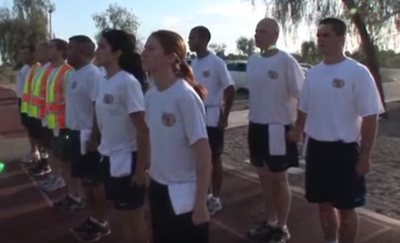Phoenix Police reservists serve a vital role in city

Phoenix AZ February 18 2019
The only difference between Sgt. John Rodeman and most of the other officers at the Phoenix Police Department’s South Mountain precinct is a paycheck.
Rodeman, who also is digital marketing director for Taylor Morrison, is a reserves officer, one of about 120 volunteer police officers who comprise a division that has served the department and Phoenix residents for a century as of last year.
Reserves officers have the same uniforms, emblems, badges, training and even cars as the career officers. Rodeman said the reserves division is incredibly valuable to the Phoenix Police Department.
“We can take every bit of help we can get,” Rodeman said. “Being able to take another call, it’s vital to the police operation.”
Reserves Assistant Chief Scott Finical, who also is an attorney specializing in healthcare litigation, said reserve officers donated a little over 38,000 hours of services in 2017 alone – which has a value of $2.6 million if the services were paid as career officers are.
He also said the reserves are a critical component of the Phoenix Police Department.
“If a citizen calls for service or they’ve been a victim of a burglary or some type of crime, these officers respond to those calls just like career officers,” Finical said. “Same training, same responsibilities, same duties.”
Finical said most reserve officers have established careers outside the reserve division.
He said a major motivation for most men and women to be in the reserves is the ability to give back to the community and make it a safer place for people to live.
“They’re successful professionals and this is an opportunity for them to give back in addition to what they do professionally in paying jobs,” he said.
Finical said there are many reserve officers joined because of an interest in law enforcement. The Phoenix reserve division gives people the opportunity to try out the experience on a part-time basis while they continue with school or in their profession.
Reserve officers undergo academy training, a 10-month process that adds up to 740 hours of practice.
Finical said this can be one of the most difficult tasks facing a reserve officer.
“As you can imagine, if you have an established career, a family, attending the academy on a 10-month basis is a very substantial commitment,” Finical said. “That is probably the first and most immediate hurdle that people need to successfully complete.”
Following the academy training, reserves go through a field training program of 680 hours during which they ride with training officers. They must complete 1,400 hours of this training before they can work independently.
Sgt. Joshua Clark, a career officer with Phoenix Police, said the training process mirrors the career police academy. It covers search and seizure, legal processes, Arizona constitutional traffic laws, firearms, defensive tactics, tactical driving, scenario-based training and other training practices.
“They’re equipped, they’re trained and they’re ready to respond in the same way any of us career officers are,” Clark said.
Clark said the reserves officers have the same authority and perform the same work as the career officers. He said sometimes the public does not know about the work of reserves officers because they are so similar to career officers.
“Oftentimes their contributions aren’t widely known outside of our organization because they’re so seamlessly integrated throughout all these work units in the department,” Clark said.
Clark said reserves officers bring their professional careers – be it a doctor, pilot or even software programmer – into police work and that the department is able to use the expertise they have in certain fields.
Rodeman said career officers recognize him in the field and ask for his help because they know about his specialties.
Finical said the reserves division has continued to improve in training and size since its inception in 1918, when members of the community banded together to patrol the streets. Now, he said, the division has expanded.
“Our full-authority officers work not only as patrol officers but detectives, or helicopter pilots, or motorcycle officers, training officers, members of the SWAT team, transit officers,” Finical said. “Our officers are throughout the department.”
Rodeman said the reserves officers are not concerned with a paycheck, but with how to help a person in a bad situation. He said it takes dedication and a desire to serve the community to volunteer in the reserve division.
“These are people that are not afraid to run into danger, instead of away from it,” Rodeman said.
ahwatukee.com



